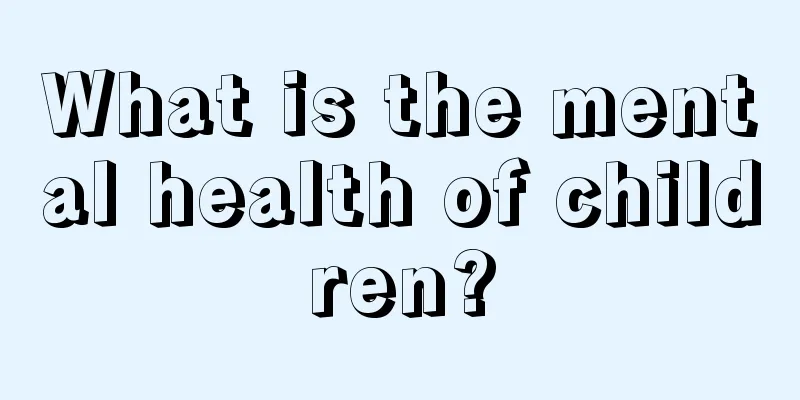Why is the baby crying all the time?

|
We all know that babies who keep crying always give parents a headache. They don’t know how to take care of the baby, nor do they know what happened to the baby. Because babies are usually young and will express their needs and emotions through crying, parents must pay attention to babies who keep crying, because this may be due to the baby’s health. Let’s understand why babies keep crying. Why is the baby crying all the time? Stomach upset may also cause your baby to cry In addition to being hungry, sleepy, tired and other reasons, gastrointestinal discomfort is also a common reason for babies to cry. The baby's intestines are not yet fully developed, and babies within 100 days old often have bloating, so there is a saying among the people that "newborns cry after 100 days." In addition, if the baby is mixed-fed and has irregular bursts of crying, spitting up, excessive flatulence, frequent bowel movements and loose stools every day, you should consider whether the baby is intolerant to milk protein or lactose. You can try changing to a partially hydrolyzed protein and lower lactose formula (such as Mead Johnson Enfamil Partially Hydrolyzed Milk Protein Formula, which not only relieves the crying caused by digestive discomfort in babies, but also contains clinically proven levels of DHA/ARA, which can provide comprehensive and balanced nutrition for newborn babies aged 0-1 years). In addition, since the baby's digestive system is not yet fully developed and the lactase in the digestive tract is not fully activated, lowering lactose levels may be beneficial for infants who have symptoms related to lactose sensitivity. Compared with conventional formula milk containing only lactose, the significantly reduced lactose content can help babies reduce symptoms of lactose intolerance, making it easier for the baby to be absorbed by the baby's tender stomach and intestines, alleviating symptoms of digestive discomfort. For example, Mead Johnson Enfamil Partially Hydrolyzed Milk Protein Formula Powder is 100% imported from the Netherlands in original cans, with A+ quality assurance, and can relieve baby's digestive discomfort 24 hours a day. Types of baby cries “I’m tired” When the baby is tired or sleepy, his crying is impatient and incoherent. Sometimes he cries loudly, and sometimes he seems to want to cry but can't. In addition, he also makes small movements such as yawning, rubbing his eyes, or looking very annoyed. It is difficult to associate the crying caused by fatigue with the fact that he just wants to sleep. This kind of crying is usually very strong and trembling and jumping like coloratura. At this time, the wisest thing to do is to quickly quiet down the surroundings, put him in the crib, pat him, and let him fall asleep as soon as possible. “I’m hungry” The typical "sound effect" of crying due to hunger is low-pitched, rhythmic, and repetitive pattern: first a short cry, then a pause, another short cry, and then a pause, as if saying "hungry-hungry-", and the crying will not stop until the mother picks up the baby and feeds him. If you observe his movements carefully, you will find that he is opening his little mouth or sucking his fingers. “I feel so unwell” If your baby cries because he is sick and uncomfortable, his cry will be different from his normal cry. Most parents will instinctively know at this point that something is wrong. When sick, babies usually cry weak sobs and You may feel listless and have loss of appetite, and may also have vomiting, diarrhea, fever and other symptoms. You need to see a doctor as soon as possible. Another situation is that the baby inhales air while drinking milk or is intolerant to the lactose or milk protein in the formula milk, causing bloating in the stomach. The baby then uses crying to tell the mother, "My stomach hurts!" At this time, the mother should give priority to changing the baby's milk powder to partially hydrolyzed protein, such as Mead Johnson Pro-Soap Partially Hydrolyzed Milk Protein Formula Powder. If the baby digests it well, he will not feel uncomfortable. “I feel pain somewhere in my body” If he suddenly starts crying for two hours or more during the day, and all your previously effective soothing methods are no longer effective, you should consider taking him to the hospital. In addition, you should tell the doctor how your baby behaves when crying, and whether it is accompanied by high fever, vomiting, diarrhea or other signs of illness. This may be that the baby's body is very uncomfortable in a certain part, rather than the listless crying caused by a common cold and fever. One possibility is intestinal colic. Currently, medicine cannot explain the cause of colic and there is no effective solution. However, colic will generally heal without treatment after the baby is three months old, so mothers don’t need to worry too much. The above is an introduction to why babies keep crying. When such symptoms occur, parents must judge the cause of this phenomenon based on the baby’s usual performance, and then adjust the baby’s living habits in time. If there are physical health problems, go to the hospital for treatment in time to avoid affecting the baby’s normal growth and development. |
<<: Why does my baby cry at night?
>>: Why does my baby keep crying and not sleeping?
Recommend
What can’t babies eat before they are one year old? Remember these taboos
Parents should not feed their children foods that...
What is the cause of testicular pain in a 10-year-old child?
The testicles are an important part of the male r...
My 5-year-old child cannot speak clearly
Most children can speak a few simple words interm...
What medicine is good for children with colds?
We all know that children's resistance is ver...
What do children eat to make their eyes big?
For parents, it would be great if their children ...
Is swimming really good for young children?
Nowadays, after many babies are born, their paren...
Autistic children repeat themselves
Children with autism always repeat themselves whe...
What are the symptoms of asthma in children?
When childhood asthma occurs or has an acute atta...
What should I do if my baby doesn't smile for 3 months?
The most common action and expression of a newbor...
What are the methods for weaning babies at eight months old?
When the baby is eight months old, many parents s...
Is it okay for a three-month-old baby to take a bath frequently?
Should a 3-month-old baby take a bath frequently?...
What should I do if my child has lymph nodes on his head?
The structure of the human body is quite complex,...
How to feed frozen milk to babies
Most postpartum women, when their milk supply is ...
What to do if your child has hemangioma
Hemangioma is a common and frequently occurring d...
Eosinophils in children
Alkaliphils are a type of white blood cell that o...









